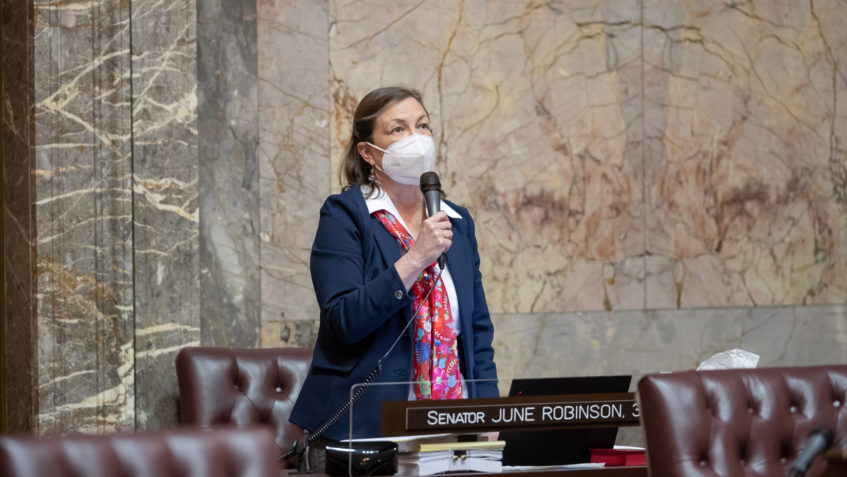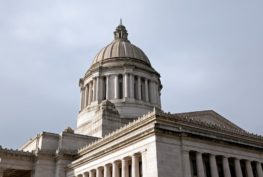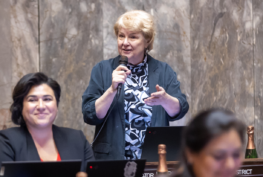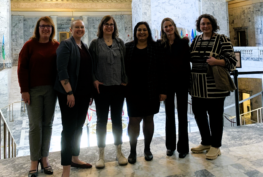OLYMPIA – Earlier today, the Washington State Legislature approved a critical piece of tax reform legislation. Senate Bill 5096, sponsored by Sen. June Robinson, D-Everett, enacts a capital gains excise tax to fund the expansion and affordability of child care, early learning, and the state’s paramount duty to provide an education for the children of Washington.
After passing the House on April 21, the bill was sent to conference following the Senate’s refusal to concur with House amendments. The final bill adjusts the distribution of collected revenues by capping deposits in the Education Legacy Trust Account at $500 million annually and directing additional revenues to the Common School Construction Account. It also now includes a charitable donation deduction for taxpayers donating at least $250,000 to qualified nonprofit organizations that tax year.
“This important step to rebuild our unfair tax code was taken after years of work, years of dialogue, and thousands of voices calling for this policy,” said Robinson, who also serves as the Operating & Revenue Vice Chair of the Senate Ways & Means Committee. “We’ve heard that people from every part of our state are ready to move toward a healthier, stronger future together, and it’s time for the wealthiest among us to pay their fair share for that future.”
Washington state has the most regressive tax code in the nation. The state’s lowest-income residents pay six times more in taxes, as a share of their income, than the state’s highest income households – including some of the wealthiest individuals in the world. As a percentage of household income, low-income families pay nearly 18% in taxes, middle-income families pay 11%, and the state’s highest income households pay 3% or less. That means working families are funding a disproportionate share of the programs and services communities need, while wealthy Washingtonians pay proportionately less.
The capital gains excise tax assesses a 7.0% tax on extraordinary profits from the voluntary sale or exchange of stocks and bonds and other high-valued capital assets. The first $250,000 in profit is exempt from the tax annually. Designed to avoid taxing working families, the tax also includes exemptions for all real estate, retirement accounts, livestock, agricultural land, fishing privileges, a qualified family-owned small business, and more.
The Department of Revenue estimates the capital gains excise tax would generate approximately $500 million per year and affect approximately 7,000, or 0.2%, of all taxpayers, mainly the wealthiest in Washington. Revenues collected from the capital gains excise tax will be deposited in the Education Legacy Trust and the Common School Construction Account, and used to fund investments in K-12 education, as well as child care and early learning through the Fair Start for Kids Act. Child care is critical to economic recovery in the wake of the COVID-19 pandemic, and these investments will continue to help support the economic well-being of working families into the future.
“This capital gains excise tax, along with the Working Families Tax Rebate that we passed earlier this session, will help support working families in every corner of our state,” said Rep. Noel Frame, D-Seattle, Chair of the House Finance Committee. “By asking the wealthiest among us to share in the responsibility of funding the needs of our communities and putting money back in the pockets of low-income families via a sales tax rebate, these policies are the first steps on the path to balancing our tax code. We’ll continue down that path of tax reform with the ongoing work of the Tax Structure Work Group.”
The bipartisan Tax Structure Work Group is tasked with conducting in-depth analysis, facilitating extensive public engagement, and developing policy proposals to modernize and rebalance the state tax code. This year, the Tax Structure Work Group will engage directly with taxpayers across the state to gather feedback on several alternative tax scenarios, including possible replacements or reductions to the business and occupation (B&O), property and sales taxes alongside several possible revenue replacement alternatives to ensure revenue neutrality of the various proposals.
Senate Bill 5096 now goes to the governor to be signed into law.
###
Learn more about the Tax Structure Work Group, sign up to receive email updates, and find information on past and upcoming meetings on the Department of Revenue dedicated website for the Work Group.





